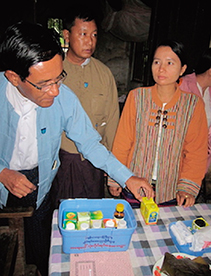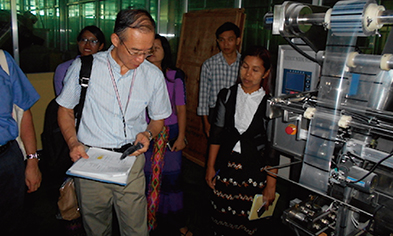Master Techniques from Japan to the World 4
Introducing Toyama’s System of “Okigusuri (Drugs for Household Delivery Business)” to the World
– Efforts Toward Enhancing Health and Hygiene in Myanmar through the Improvement of Traditional Medicines*
In Toyama Prefecture, there is a culture of “okigusuri.” It is a system wherein each household is asked to set a medicine box in their home which houses a variety of medicines, and a salesperson called a Baiyaku-san visits each household periodically, collects the fees for drugs that have been used, and replenishes those that are running low. The fact that Toyama gained prominence nationwide as the prefecture that is home to the production of pharmaceutical products is said to originate with an old story. Long ago, when Lord Miharu of Fukushima Prefecture suffered a severe stomach ache at Edo Castle, Lord Toyama presented him with a medicine he happened to be carrying, and the stomach ache got better. Consequently, the lords from all around the country who saw this requested that Toyama should sell medicines of Toyama widely within their own domains. Today, there are approximately 80 drugs manufacturing companies within Toyama Prefecture.

Official of the Department of Traditional Medicine, Myanmar (equivalent to a Baiyaku-san), explaining the okigusuri to local residents (Photo: University of Toyama)

Toyama prefecture’s expert in pharmaceutical products manufacture and quality management giving advice on manufacturing equipment in the new plant (Photo: University of Toyama)
On the other hand, in developing countries, there are many regions where medicines do not adequately reach the rural areas. Based on the idea that, although support is of course needed for the manufacture of good-quality pharmaceutical products in developing countries, an okigusuri system where a Baiyaku-san travels around to rural areas periodically would also be appropriate support for developing countries which have underdeveloped distribution methods. The Toyama Prefectural Government, the University of Toyama, and local companies have been jointly considering the possibility of providing support for developing countries which have problems in manufacturing, sales, and distribution of pharmaceutical products. Meanwhile, from 2006 through 2011, Toyama Prefecture provided assistance for activities to spread the okigusuri system in Mongolia, implemented by the Nippon Foundation. The system for traditional medicines has spread to Myanmar referring to the system in Mongolia. At the same time, guidance has been received since 2011 in response to the demand for technical support relating to quality analyses of traditional medicines at the University of Toyama, Institute of Natural Medicines, to try and maintain the quality of those traditional medicines.
In 2014, with support from the JICA Partnership Program (Special Category of Local Government Type), a project was started, with Research staff Mr. Katsuhiro Konno of the University of Toyama Institute of Natural Medicine taking the central role, to transfer the technology for the manufacturing management and quality management of pharmaceutical products to employees of pharmaceutical plants and the Ministry of Health and Sports, Department of Traditional Medicine, which are in charge of traditional medicines, with the objective of enhancing the quality of traditional medicines in Myanmar.
“Alongside malaria and others, diarrhea is regarded as one of the six major diseases in Myanmar, suffered by many people who contract it due to the poor hygienic environment, which can be hazardous if the condition deteriorates. At the time, manufacturing methods for anti-diarrhea medicines were not established yet, so we began with support for drug manufacturing,” refl ects Research staff Mr. Konno of the early days. By continuing steady activities like this over the three years to 2016, the quality of pharmaceutical products in Myanmar gradually improved, to the point where they are now highly regarded by the local people including healthcare professionals.
Since 2017, as the second stage of the project in Myanmar, they have been constructing a new drug manufacturing plant to produce traditional medicines, and implementing technical support relating to the management of facilities and products, and others. The plants currently in use are extremely old and not well equipped, which made it very difficult to raise the quality of pharmaceutical products. With regard to the construction of the new plant, drugs manufacturing companies from Toyama Prefecture have been involved, and are also giving advice on drug manufacturing, based on global standards for the manufacturing management and quality management of pharmaceutical products. Once the plant is complete, this project is expected to realize the manufacture of drugs with global-level quality.
Relevant parties from Toyama Prefecture also feel that there is adequate potential for the development of household medicines in Myanmar. As many local people reside in rural areas with poor medical circumstances, and far from towns that have a hospital, a household medicines system can be expected to play a good role. However, some challenges have become clear.
At the beginning of the household medicines activities in Myanmar, one medicine box was delivered to each village, and to date, it has been possible to set medicine boxes in approximately 30,000 villages, accounting for half of the villages in the entire country. However, according to a subsequent investigation of the situation, in most cases, the Baiyaku-san could not go around timely enough as expected, and, the boxes were left without being replenished. Having refl ected on points like this, a project wherein one medicine box is given to each household, and the Baiyaku-san visits every three months as in Japan, was implemented as a trial in approximately 500 homes. As a result, it was confirmed that the Baiyaku-san was able to refill the drugs of each household precisely. Thus, in Myanmar, it is now considered to deploy the same okigusuri system as in Japan.
Through these assistance for drugs manufacturing and household medicines, positive effects have started to appear not only in Myanmar, but even in Toyama Prefecture. In May 2018, the Toyama Pharmaceutical Association, a group made up of drugs manufacturing companies and others within the prefecture, and the Myanmar Pharmaceuticals & Medical Equipment Entrepreneurs’ Association (MPMEEA) concluded a memorandum, which stipulates the collaboration for developing trade in pharmaceuticals among other matters. Japanese drugs are highly priced in Myanmar, but since they are of high quality and very reliable, they can be anticipated to sell well, if the target for sales is focused on the wealthy population.
Mr. Kobayashi, the officer in charge of the Toyama Prefectural Health & Welfare Department Pharmaceutical Policy Division, which is involved in the project in Toyama, said the following. “The pharmaceuticals industry in Toyama Prefecture is one of the pillars that will support the growth of the prefecture going forward. Helping developing countries in raising the quality of pharmaceutical product, will also bring a positive impact on the industry in Toyama Prefecture. We would like to continue our support over the long term, while building this win-win relationship.”
* In Myanmar, the jurisdiction of the Government for the manufacture and sale of so-called western-style medicines differs from that for traditional medicines; traditional medicines are manufactured in state-run factories under the jurisdiction of the country’s Ministry of Health and Sports, Department of Traditional Medicine.
<< Previous Page
Main Text | Reference Statistics | Stories from the Field | Master Techniques from Japan to the World | ODA Topics
